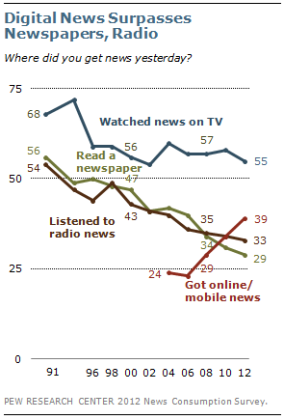Often times when I tell people that I’m a Journalism major their first response is to ask me why—don’t I know journalism is a dying field? What these people don’t understand is that while the journalism industry is undergoing rapid change it isn’t dying off at all, but rather adapting and transforming into an even more useful and advanced resource. And while I appreciate such heartfelt, unsolicited advice to switch to a more practical degree, I couldn’t be more excited to dive into the world of journalism during one of its most momentous, though not its first, transformations ever.
The Watergate Scandal was a pivotal time in Journalism history; it sparked a mass interest in investigative journalism and proved the immense influence journalists’ wield in the political landscape. Two journalists for the Washington Post, Bob Woodward and Carl Bernstein, are often accredited with leading to the resignation of President Nixon. In his book Mightier Than the Sword: How the News Media Have Shaped American History Rodger Streitmatter states that the Post’s reporting was a “journalistic triumph” and that “at no time in American history has the importance of such a free press been more dramatically illustrated than during the bleak chapter that was symbolized by the early morning in 1972 when five men … broke into the Watergate office complex — and the country would never be the same.” This exalting claim illustrates both the importance of journalism as a regulator of justice and the dramatic ways in which the journalism industry has changed over the past few decades. The Washington Post is accredited with basically being the sole media resource involved in the investigation of and thus take-down of Nixon. The fact that a print newspaper was the leading source of information throughout the investigation starkly contrasts the news media environment today, where print newspaper readership is on a steady decline.
Conversely, news found online and from mobile devices is quickly becoming the most accessed form of media coverage. Though television news is still very popular even that too has taken a hit in viewership over the past few years, possibly succumbing to the incomparable convenience of mobile sources. I believe the real reason for the sharp increase in online news is the rapidly expanding online social network. Most people today, both young and old, spend a significant amount of time each day checking some sort of social media outlet or online news source. In a 2012 survey conducted by the Pew Research Center 41% of all adults said they used Facebook yesterday (“In Changing News Landscape, Even Television is Vulnerable”). Most young adults seem to not be able to survive without social networking sites, such as Facebook and Twitter, for more than 24-hours, fearing a loss of connection with their peers and the outside world. And while may older adults scorn the younger generation for their obsession with technology and especially their cell phones, their intense attachment might actually be a sign of a more worldly awareness (and a serious case of FOMO). Though this most current and increasingly popular media news source appears shallow or unorthodox, its convenience and flexibility appeals to all viewers, thus explaining its increased viewership.
If the Watergate Scandal were to occur today it wouldn’t be print newspaper headlines that spark controversy and conversation amongst Americans but rather Facebook posts and Tweets. Both personal opinions and the statements of reliable news stations would swarm people’s newsfeeds, making the Scandal an even more controversial and infamous event. Even print newspapers are learning to adapt to today’s tech-savvy environment, starting Twitter and Facebook accounts of their own and posting their printed articles on high-speed online websites as well. While these techniques might offer print newspapers a chance at survival in the news network, I believe people will still always opt for the simpler, more direct form of news coverage that television broadcasts and social network posts provide. Yet this transition isn’t something to lament, but rather a cause for celebration. If this sort of social media and television broadcasting existed during the time of the Watergate Scandal Nixon’s criminal activities probably would have been discovered much sooner. What’s more, these progressive news sources would have allowed for more people, both experts and ordinary citizens alike, to share their opinions with the world and argue their beliefs in a constructive and informative manner. Furthermore, Nixon himself, and all of the officials involved in the Scandal would have also been able to voice their concerns and argue for their innocence or for the guilt of others. This would provide everyone with a more holistic and better-informed understanding of America’s political atmosphere.
These new possibilities that social media provides would have the power to both further murk the truth and eschew the lies. Nixon, as a very charismatic leader might possibly have been able to talk himself out of guilt with television broadcasts and personal appeals through social media. Yet, the likeliness of this is slim for with increased social awareness comes a stronger and more broad drive for people to uncover the truth and expose the indecencies of others. The expansion of online social media has transformed every citizen into a journalist, diminishing wrong doers’ chances of escaping blame for their mistakes. With such increased social awareness and activeness who knows, maybe Nixon would have never partaken in such blatantly illegal actions in the first place.
Resources:
“In Changing News Landscape, Even Television is Vulnerable.” Pew Research Center For People and the Press. 27 Sep. 2012. http://www.people-press.org/2012/09/27/in-changing-news-landscape-even-television-is-vulnerable/
Streitmatter, Rodger. Mightier Than the Sword: How the News Media Have Shaped American History. Boulder, CO: Westview Press, 1997. Web.

